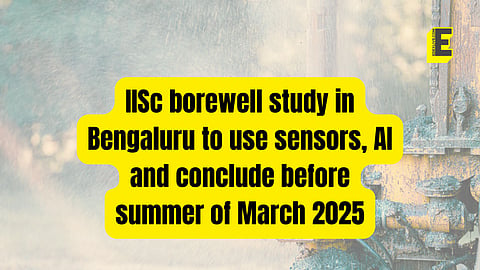

Soon, instruments will be put up near borewells and at designated places in all wards in Bengaluru to know the groundwater levels real time.
This is part of a study undertaken by researchers from the Indian Institute of Science (IISc), Bengaluru and officials of Bangalore Water Supply and Sewerage Board (BWSS).
As part of the study, a portal and dashboard are also being created for real-time monitoring of data, where a balance sheet of groundwater will be maintained, according to a report by The New Indian Express.
"Drinking water, more so groundwater, is a concern across the country. But in Bengaluru it is a larger issue. With the rapid pace of construction in the city and increased groundwater extraction, there is no knowledge of how much is present in the ground and what next. This study will help channelise demand and supply," said researchers from the Interdisciplinary Centre for Water Research, IISc, who are part of the study.
The need for the study arose during the recent water crisis in Bengaluru. A few areas, especially north Bengaluru, have been declared grey areas and more are being added to the list. The study is being done to channelise Cauvery water and ensure there is adequate supply, said a senior BWSSB official.
The instruments near borewells and at designated places measure groundwater usage in a scientific manner. The study will tell how much is used and where it is going. It started in July and so far ground truthing of the wards has been done.
IISc researchers said, "The focus needs to be on the CMC (Critical Micelle Concentration) and TMC (Thousand Million Cubic) areas and 110 villages where extraction and exploitation is high."
BWSSB Chairman Ram Prasath Manohar told The New Indian Express that the study is the first of its kind in the world where artificial intelligence (AI) will help improve water availability for Bengalureans. So far, conventional methods were used, where staffers would go once in three to six months to ascertain groundwater levels.
“Now a base line and critical level of each region is being created for comparison. Around 400 sensors will be put up in the city. The study will be completed before March 2025 and ready for the summer. Gradually, individuals who have borewells will also be requested to install the sensors, based upon requirement,” Manohar said.
